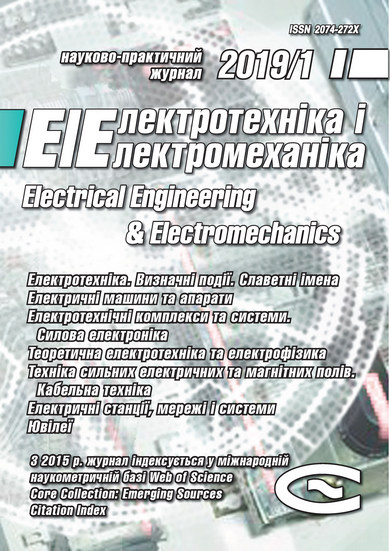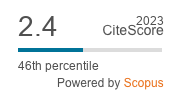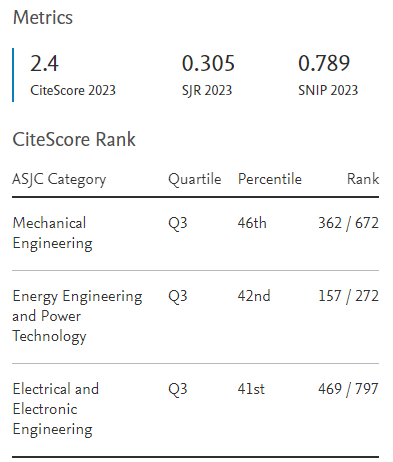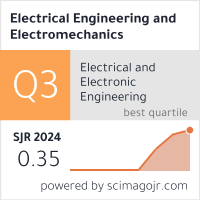ANALYSIS OF OPERATING CONDITIONS AND MODES INFLUENCE ON TECHNICAL STATE OF MAIN INSULATION OF HIGH-VOLTAGE BUSHINGS OF DIFFERENT DESIGN
DOI:
https://doi.org/10.20998/2074-272X.2019.1.10Keywords:
high-voltage bushing, insulation, two-factor cross-sectional dispersion analysis, insulation indicators, dielectric loss tangentAbstract
The results of the analysis of the influence of operating conditions and design of high-voltage bushings on the values of dielectric loss tangent of high-voltage bushing basic insulation. For analysis a model of two-factor cross-sectional dispersion analysis, which allows to simultaneously evaluate the influence of two factors and evaluate the effect of their interaction is used. In the model used, it is assumed that the effects of changes in the levels of factors are non-additive, that is, the difference in mathematical expectations between any two levels of one factor is not the same for any levels of the other. Testing the hypothesis of the significance of the influence of factors and their interactions is performed using the Fisher criterion. This method was implemented in the form of the author’ program «two-factor dispersion analysis». The results of periodic monitoring of the state of high-voltage bushings of 110, 220 and 330 kV with different types of insulation were used as initial data. Using the model of two-factor cross-sectional dispersion analysis, it was found that the aging intensity of the main insulation of bushings is influenced by both the operating conditions and the design features of the bushings. Maximum permissible values of diagnostic indicators of high-voltage bushings should be normalized taking into account such factors as nominal voltage, type of protection and type of insulation, load of bushings and the composition of consumers. Since, based on the analysis performed, it was established that these factors have a significant impact on the values of diagnostic indicators of insulation of bushings. According to the results of the analysis performed, it was established that such factors as the type of bushing and phase do not have a significant effect on the change in the values of diagnostic indicators of high-voltage bushings, and, therefore, they can be ignored when determining the maximum permissible values of the indicators.References
1. SOU-N EE 20.302: 2007. Normy vyprobuvannja elektroobladnannja [Norms of testing of electrical equipment]. Kyiv, Ministry of Fuel and Energy of Ukraine, 262 p. (Ukr).
2. Shutenko О., Zagaynova A., Serdyukova G. Analysis of distribution laws of insulation indicators of high-voltage oil-fillled bushings of hermetic and non-hermetic execution. Technology audit and production reserves, 2018, vol.4, no.1(42), pp. 30-39. doi: 10.15587/2312-8372.2018.140873.
3. Feilat E.A. Analysis of the Root Causes of Transformer Bushing Failures. International Journal of Computer, Electrical, Automation, Control and Information Engineering, 2013, vol.7, no.6, pp. 791-796.
4. Anglhuber M., Juan L. Contreras Velásquez. Dispersing the clouds – gain clear insight into your bushings using advanced diagnostics method. Transformer Magazine. Special Edition: Bushing, 2017, pp. 126-132.
5. Septyani H.I., Arifianto I., Purnomoadi A.P. High voltage transformer bushing problems. Proceedings of the 2011 International Conference on Electrical Engineering and Informatics, Jul. 2011. doi: 10.1109/iceei.2011.6021566.
6. Metwally I. Failures, Monitoring and New Trends of Power Transformers. IEEE Potentials, 2011, vol.30, no.3, pp. 36-43. doi: 10.1109/mpot.2011.940233.
7. Rubanenko А.E., Gumenyuk A.I. Vysokovoltni vvody. Konstruktsiia, ekspluatatsiia, diahnostyka i remont [High-voltage bushings. Design, operation, diagnostics and repair].Vinnitsa: VNTU Publ., 2011. 183 p. (Ukr).
8. IEC – 60137, Edition 7.0 2017-06. International Electro-technical Commission Standard for Insulated bushings for alternating voltages above 1000 V.
9. IEEE Std C57.19.01: Performance Characteristics and Dimensions for Outdoor Apparatus Bushings, 2000.
10. Andrienko P.D., Sakhno A.A., Konogray S.P., Spitsa A.G., Skrupskaya L.S. Features of monitoring the technical condition of the main insulation of high-voltage bushings and current transformers. Electrical engineering and power engineering, 2014, no.1, pp. 43-48. (Rus). doi: 10.15588/1607-6761-2014-1-7.
11. Anikeeva M.A., Arbuzov R.S., Zhivodernikov S.V., Lazareva E.A., Ovsyannikov A.G., Panov M.A. Diagnostic signs for rejection of high-voltage bushings with oil-paper insulation. ELEKTRO. Electrical engineering, power industry, electrical industry, 2009, no.1, pp. 22-25. (Rus).
12. Lvov M.Yu. Colloid-dispersed processes in high-voltage sealed bushings of transformers. Electric stations, 2000, no.4, pp. 49-52. (Rus).
13. Snetkova O.V. Experience of diagnostics of 110-500 kV oil-filled bushings in Mosenergo. ELEKTRO. Electrical engineering, power industry, electrical industry, 2004, no.2, pp. 39-42. (Rus).
14. Osotov V.N. Errors in measuring dielectric characteristics and assessing the state of high-voltage bushings. Proceedings of the 10th annual conference «Methods and means of insulation control of high-voltage equipment».Perm: Dimrus Publ., 2013. (Rus).
15. Zahaynova O.A. Analysis of the influence of different factors on the aging of the insulation capacitor type high-voltage input. Energy saving. Power engineering. Energy audit, 2015, no.10(141), pp. 17-25. (Rus).
16. Scheffe G. Dispersionnyi analiz [Dispersion analysis].Moscow, Nauka Publ., 1980. 512 p. (Rus).
17. Johnson N. Statistika i planirovanie eksperimenta v tekhnike i nauke [Statistics and Experiment Planning in Engineering and Science].Moscow: Mir Publ., 1981. 520 p. (Rus).
18. Davidenko I.V. Investigation of indicators describing the operational state of oil-filled bushings, using mathematical statistics. University news. North-Caucasian region. Technical sciences series, 2006, no.15, pp. 31-33. (Rus).
19. Gmurman V.E. Teoriia veroiatnostei i matematicheskaia statistika [Theory of Probability and Mathematical Statistics].Moscow, High school Publ., 1977. 479 p. (Rus).
20. Shutenko O.V. Evaluation of the influence of operating conditions on the intensity of aging of transformer oils. Bulletin of NTU «KhPI», 2010, no.1. pp. 171-179. (Rus).
21. Shutenko O.V., Abramov V.B., Baklay D.N. Analysis of factors affecting the homogeneity of arrays of concentrations of gases dissolved in oil. Energetic and electrification, 2013, no.6, pp. 39-50. (Rus).
22. Davydenko A.P. Organizatsiia i planirovanie nauchnykh issledovanii, patentovedenie [Organization and planning of scientific research, patent science]. Kharkiv, NTU «KhPI» Publ., 2004. 320 p. (Rus).
23. Shutenko O.V., Baklay D.N. Planirovanie eksperimental'nykh issledovanii v elektroenergetike. Metody obrabotki eksperimental'nykh dannykh [Planning of experimental research in the electric power industry. Methods for processing experimental data]. Kharkiv, NTU «KhPI» Publ., 2013. 268 p. (Rus).
24. Svi P.M. Kontrol' izoliatsii oborudovaniia vysokogo napriazheniia [Insulation control of high voltage equipment].Moscow, Energoatomizdat Publ., 1988. 128 p. (Rus).
Downloads
Published
How to Cite
Issue
Section
License
Copyright (c) 2019 O. V. Shutenko, A. A. Zagaynova, G. N. Serdyukova

This work is licensed under a Creative Commons Attribution-NonCommercial 4.0 International License.
Authors who publish with this journal agree to the following terms:
1. Authors retain copyright and grant the journal right of first publication with the work simultaneously licensed under a Creative Commons Attribution License that allows others to share the work with an acknowledgement of the work's authorship and initial publication in this journal.
2. Authors are able to enter into separate, additional contractual arrangements for the non-exclusive distribution of the journal's published version of the work (e.g., post it to an institutional repository or publish it in a book), with an acknowledgement of its initial publication in this journal.
3. Authors are permitted and encouraged to post their work online (e.g., in institutional repositories or on their website) prior to and during the submission process, as it can lead to productive exchanges, as well as earlier and greater citation of published work.





